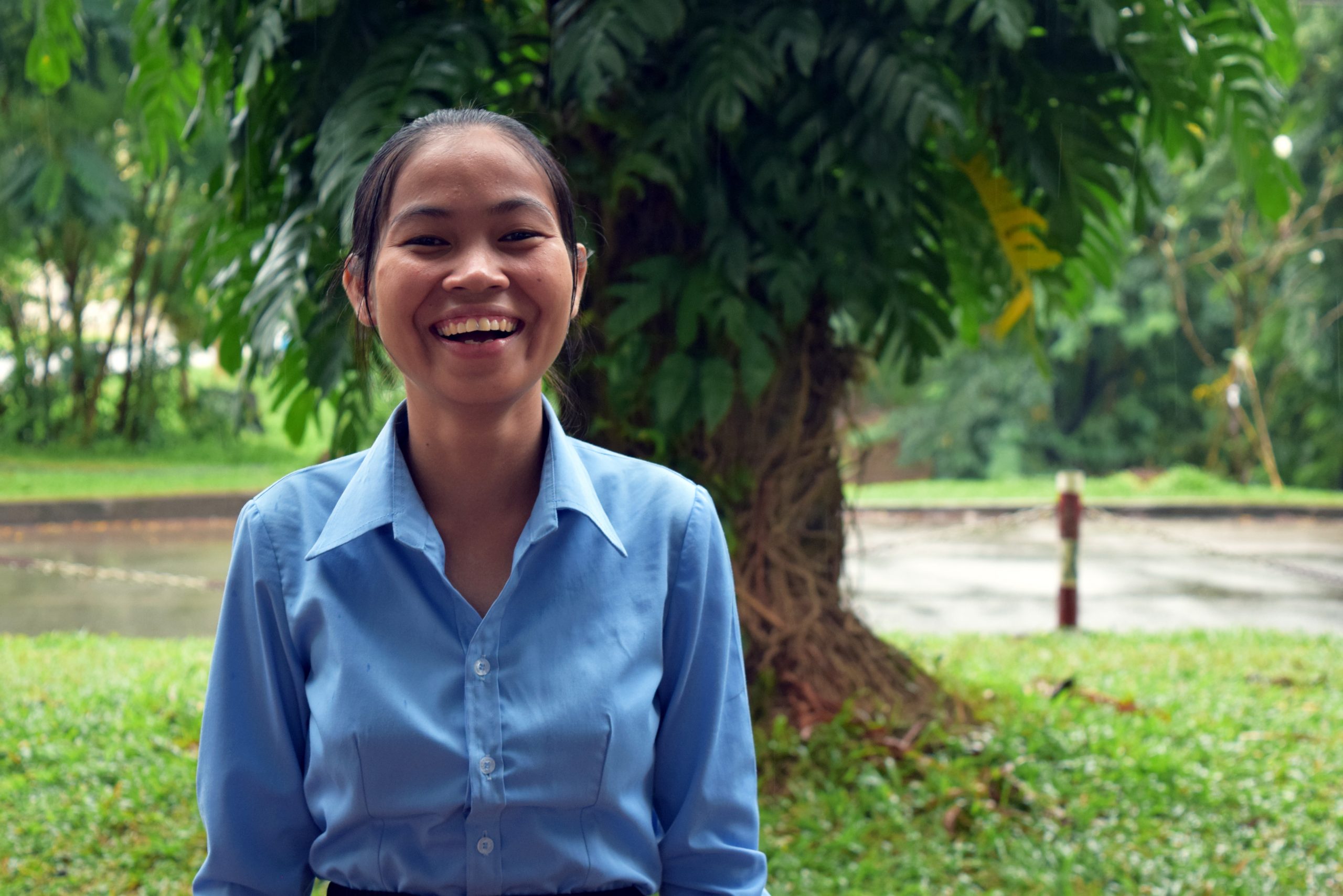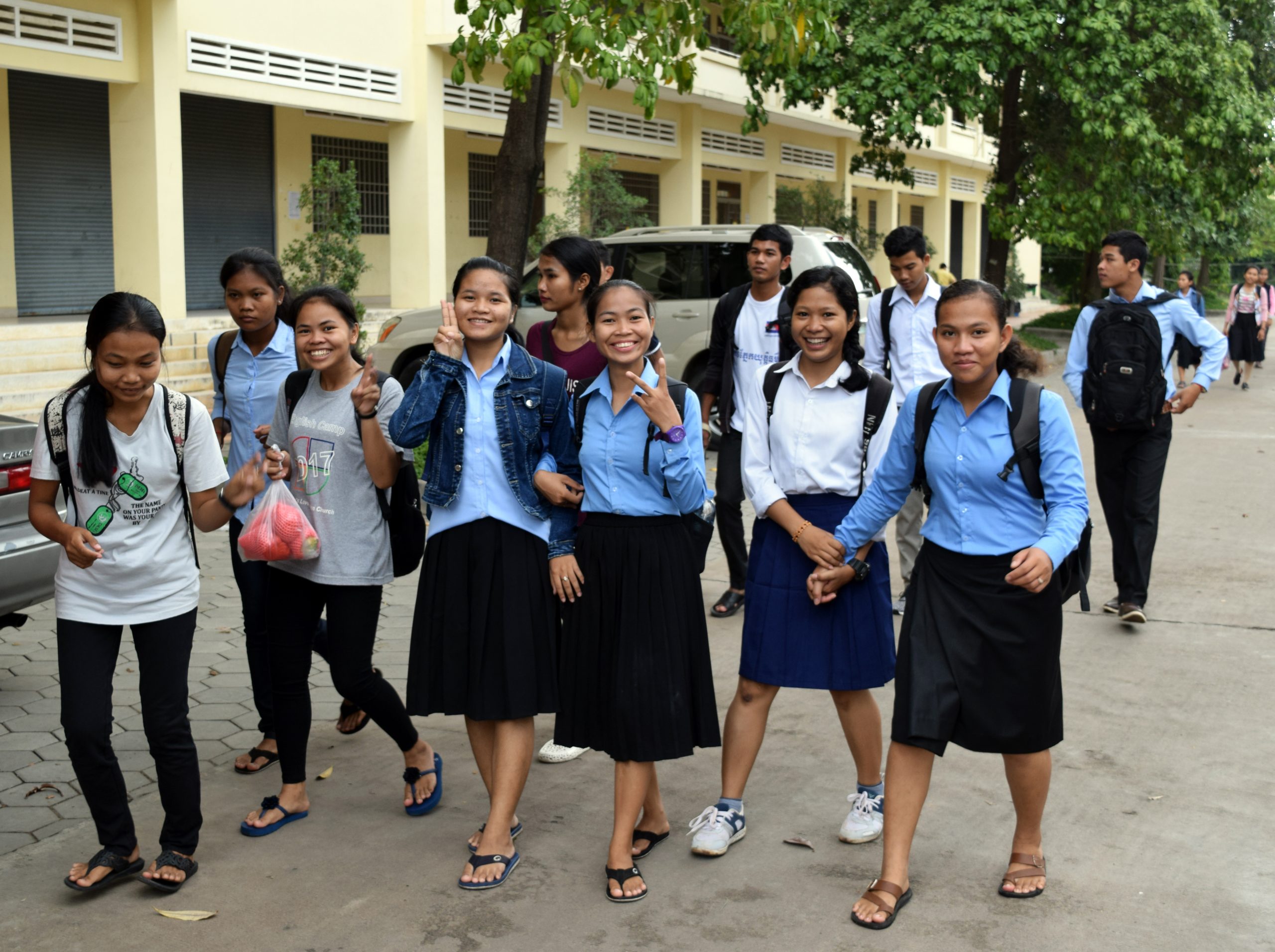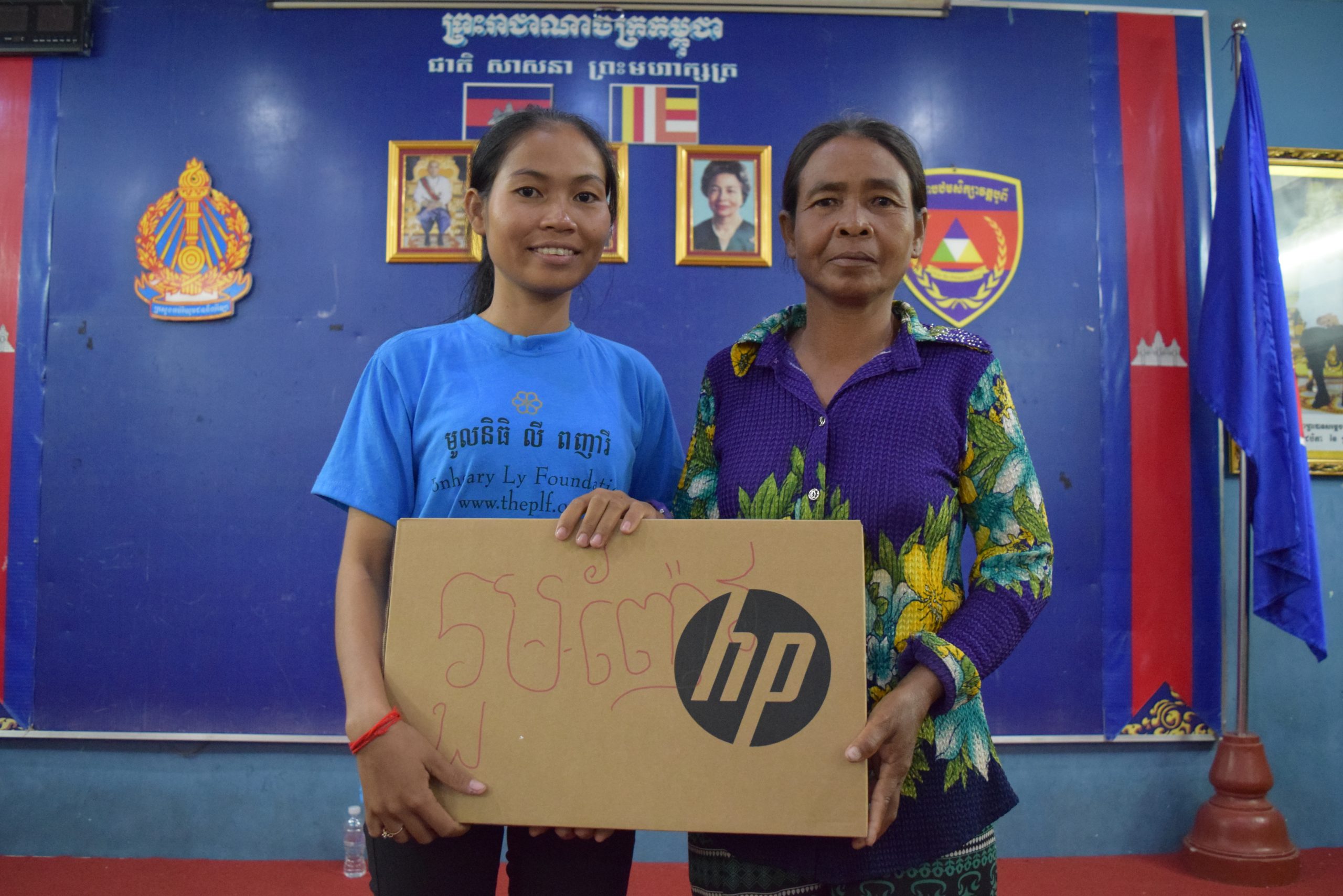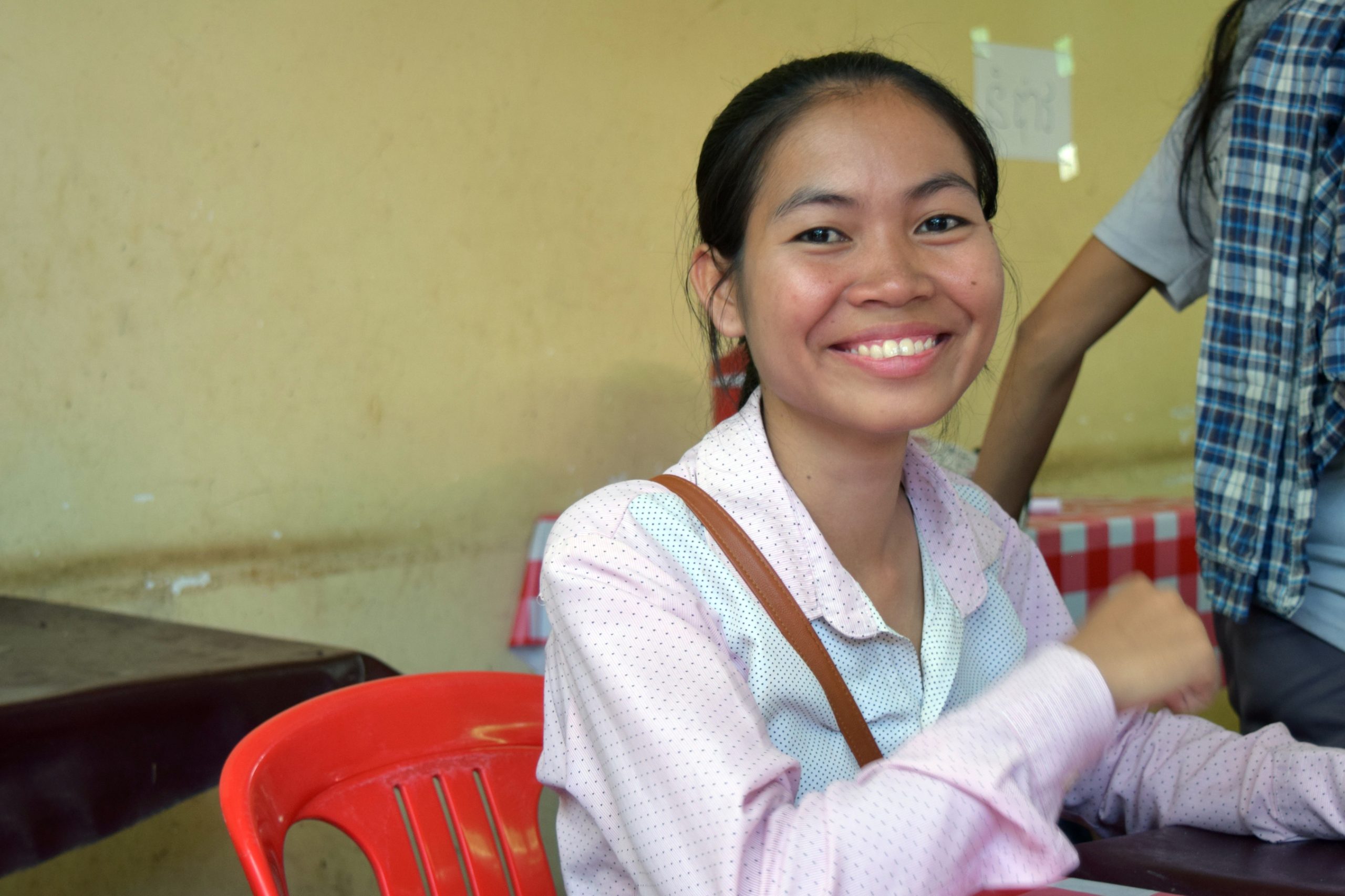We know how inspiring our Students are and we thought it was about time you, our friends and donors, could get to know them for yourselves. Throughout this series, you will hear directly from the students about their lives, their struggles, their dreams, and passions.
3rd year, Khmer literature degree at Royal University Phnom Pehn
Can you tell us about school in your hometown?
Talking about education in my hometown, life there is difficult. It’s difficult to live there because there aren’t a lot of people, there’s no school. There’s only a school in the village nearby, so the children who live in my village they have to ride a bicycle in order to study because if they walk it is too far. Most parents in my village don’t have time to bring their children to school so it’s only the students who are big enough to ride a bicycle can get an education on their own. It was really difficult for me when I was living at home. The education is my hometown is very low. Most parents push their children to stop school when they are around 13-14 years old because at that age they are old enough to help their parents grow rice, grow cassava, or generall help make money for the family. The adults in my village think differently from those of who are more educated. If you have a low education it’s difficult to understand the value of school. Parents who don’t value education won’t push their children to get a good score because they think – what is the benefit?
They don’t really know about education. I think that when I have more knowledge I will go teach the people in my village and talk about bringing their children to school, how their children can benefit, what is the result.
Now I have a lot of knowledge. Whenever I go home I always talk with the parents in my village, my neighbors, that they should bring their children to school so that they can have knowledge. When they have knowledge they can help their family. I always tell them this, and tell them that the thing I want to do with my future but I only do some because I am still studying. They aren’t so interested in my future yet but that’s okay because it’s still a work in progress.
” The children in my village, if their parents told them to stop studying then they would stop. They would follow their parents. But I wasn’t like that. I loved school”

What about your family, can you tell us about the level of education in your family?
My father doesn’t really have knowledge. The people in my village, if there’s a family whose children drop out of school then they will follow their parents and do the same work that their parents do. The people in my village they all do the same thing, they follow each other. Like my parents, they didn’t let me study. They thought that what is the point of an education? When you finish school you will still be a rice farmer like us. They always said this. But I wasn’t like the other kids in my village. The children in my village, if their parents told them to stop studying then they would stop. They would follow their parents. But I wasn’t like that. I loved school, I didn’t stop. My dream was always about education, I wanted to be a teacher. When I was in Grade 7-8 I didn’t think I would go to Phnom Penh, I figured I would graduate from Grade 12 and take the primary school teacher’s exam to become a contract teacher.
I am lucky to study in Phnom Penh. I’m so happy now.
So before, you never wanted to go to Phnom Penh or you never heard about it?
Actually, in the beginning when I lived in my village during secondary school I didn’t know what Phnom Penh was. I had never heard of it, never heard of anyone who went to study there. This is the reason that I couldn’t see past the teacher exam. When I came to study in Siem Reap I found out about Phnom Penh, I met students who had studied there, and I had a new feeling about my dream. I thought that if I could go to study in Phnom Penh it would be great, and I stopped thinking about the primary school teacher exam. Before my plan was to take the teacher’s exam as soon as I finished Grade 12, but my thoughts changed when I came to Siem Reap. I wanted to go to Phnom Penh and study to become a high school teacher.
What did you think of the other students in Siem Reap, their attitude towards education compared to the people you studied with in the countryside?
Siem Reap was SO different. When I came to Siem Reap I saw that the teachers there were great and so the students could learn a lot, they were very clever. The teachers always paid attention to their students Even my classmates, they didn’t care that I came from the countryside they didn’t treat me any differently than everyone else.
The people in the city, their parents have a lot of knowledge, so their children have a lot of knowledge too. It’s easier for them because their parents have the same values. In the countryside there’s no interest in school. In the countryside everyone is just thinking about studying year by year, no one focused on their class ranking. They only cared about successfully completing the grade. In the city it was much more competitive. Students would work hard to get the top rank in the class each month.

What do you think about education here in Phnom Penh, can you compare it to Siem Reap and your hometown? When I was living at home, I thought that Siem Reap would be so great, that it would be so different. But when I came to Phnom Penh it was even better than Siem Reap. Because in Phnom Penh in each class it’s not only people from one province, it’s people from all over the country, it’s a mix of people.
In Siem Reap the students in my classes were all from Siem Reap province, but in Phnom Penh there is much more diversity. There are students from every province coming here to study and so there is healthy competition in the class, everyone pushes each other. So now I know even more clearly that when we go to a bigger city there is more competition, everyone working hard and challenging each other to be better.
Can you talk about the difficulties of studying in Phnom Penh?
The first difficult thing with studying in Phnom Penh is homesickness, missing home. But this is a small thing, it’s not so bad. Another thing is that it’s expensive here, have to spend a lot of money. Rent, electricity, food, etc. I have to think on my own about what I will eat here, it’s not like at home where there is someone preparing meals for you or pushing you to study. I have to take care of my own health. I’m far away from my family, so I have to take care of myself on my own.
What do you think about the PLF scholarship, why is it important for the people from the countryside?
I think it’s great because PLF can help with funds for scholarship, university scholarships. No one from my village has enough money to come and study in Phnom Penh like everyone else. But if there’s a foundation like PLF offering support, this will make the people who live far away from the city, maybe they don’t have the ability on their own because of money but if they have a scholarship from PLF then they can do it.

If one person from a rural area who doesn’t really have knowledge can get a scholarship to study, when they go back to their village they can help to develop their community. Don’t you think? If one person from the village can make it to Phnom Penh to study at university, can be successful, this will make the villagers change their ideas about what their children are capable of. This will make them think, when they see the value of education.

Our #StudentChat with Ruom Nhev took place before The Government enforced school closures due to The Global COVID-19 Pandemic. After safely quarantining for 2 weeks, Nhev has returned home to her village until schools are back open.
When school closures happened across Cambodia in Mid March, PLF had 50 students at University in Phnom Penh, scattered across various Universities all over the city. The 41 students who have returned to their home villages are mobilizing into teams and speaking with PLF about their plans to render support to the most vulnerable in their communities.
Like the sound of our programs and want to get involved, but not sure how?
For as little as $10 a month, you could contribute to the ongoing education of our students. $120 goes a long way in Cambodia: that’s 5 village children on the road to education, with access to school and clean drinking water for half a year. Or a million other things, all of which coalesce into the tools needed for life to change for the better!
Follow our Instagram or Facebook accounts. Like, comment on or share our posts – Do it. It’s free. And it’s a huge help for us!
Have some questions?
Email us for a chat at [email protected]

Recent Comments